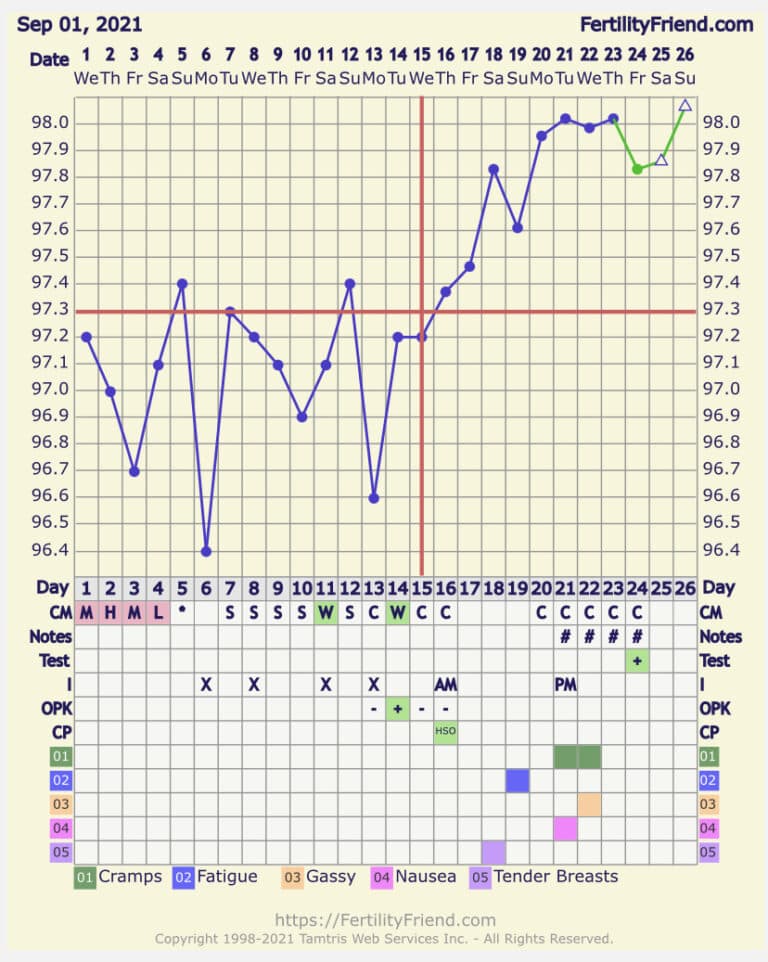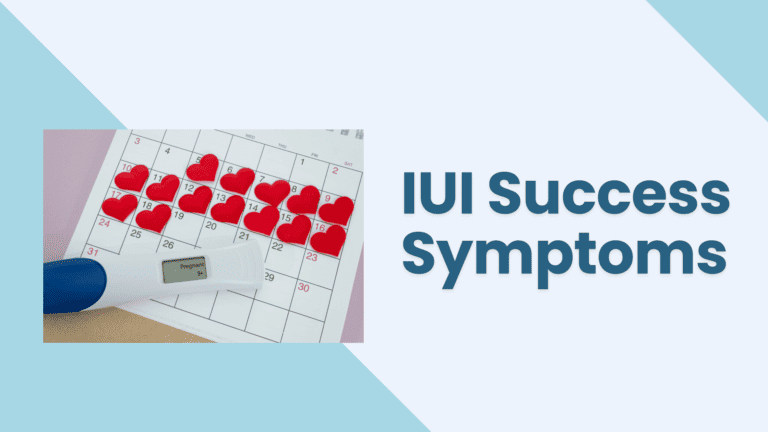Can Hormonal Imbalances Cause Infertility?

Last Updated on September 20, 2023 by Avi Steen
Are you experiencing little to no cervical mucus? Or maybe you aren’t ovulating at all? Or even simply constipated? These could be reasons for infertility. So today, we’re going to dive into the question: can hormonal imbalances cause infertility?
Can Hormonal Imbalances Cause Infertility?
The simple answer is yes; hormone imbalance can be the cause of infertility. But, it requires a deeper explanation of what is actually going on within your body that may need to be fixed.
Whether it’s polycystic ovary syndrome, blood tests that need investigating, or imbalances from your pituitary gland, there can be a lot of aspects to female fertility that can cause imbalances in the body.
And remember, the human body uses hormones as chemical messengers. If you’re experiencing symptoms like hair loss or hot flashes, these can be signs that hormone imbalance is at play.
My Fertility Journey
Six months after trying to conceive, I had to dive in and see what was going on with my hormone levels and why I hadn’t conceived yet. I wanted to know why.
I asked myself what was going on, and I was really confused, trying to figure it out on my own. Another six months went by, and I started to pray to God for a sign.
That next month I received my first BFP and a word from the Lord “open”.
That pregnancy ended in a miscarriage, and another followed that. During this time, I had to really talk with God about what was going on in my body. I’m so grateful that God cares about the little things. We can come to Him for anything!
In that season of miscarriages, I started journaling to God, and He began to speak to me about the different things that were going on with my hormones and the lifestyle changes I needed to make in order to help fix them.
After I made those changes, I actually had a 10 lb weight loss and conceived my rainbow baby in the first cycle of trying after my loss!
- The Postpartum Essentials Every New Mom Needs
- 59 Unique and Rare Baby Names in 2024
- 21 Engaging Activities: Teaching Toddlers Through Play
- 21 Breastfeeding Tips for Beginners in the First 21 Days
- Unlocking the Best Stay at Home Mom Jobs in 2024: Earn Up to $25/Hour!

Understanding the Basics: Hormones and Your Cycle
Alright, let’s start with the basics. The menstrual cycle isn’t just a monthly inconvenience; it’s a finely orchestrated symphony of hormonal shifts designed to bring your body closer to the possibility of pregnancy.
Your cycle begins with the rise of follicle-stimulating hormone (FSH), which prompts your ovaries to develop follicles containing eggs in the fallopian tubes. As these follicles grow, they produce estrogen, which thickens the uterine lining in anticipation of a potential embryo.
Women with polycystic ovarian syndrome usually have too many follicles that grow and don’t develop for ovulation, causing irregular periods.
Then comes the luteinizing hormone (LH) surge, triggering ovulation and releasing that egg into the fallopian tube, where it eagerly awaits a meeting with sperm.
After ovulation, progesterone levels increase and takes the stage to maintain the uterine lining and support a potential pregnancy. Got all that?
These hormones work in harmony to create a carefully timed ballet of fertility.

The Intricate Dance of Hormonal Balance
Now, let’s talk about why this dance needs to be choreographed just right.
Hormonal balance isn’t just about maintaining sanity during “that time of the month”; it’s a critical factor in conceiving successfully. When these hormones get out of sync, ovulation can become irregular, eggs might not develop properly, and the uterine environment may not be welcoming enough for an embryo to implant.
Signs of hormonal imbalance can include erratic and irregular cycles, a lack of fertile cervical mucus (you know, that stretchy creamy stuff), or even abnormal shifts in your basal body temperature.
So, ladies, keeping those hormones in harmony plays a crucial role to unlocking the door to conception.
A Testimony: Navigating Hormonal Imbalances
I had a client Tania who reached out with her story, and it’s something many of us can relate to. Tania had been trying to conceive for quite a while, her journey marked by confusion and frustration.
After learning about healthy lifestyle changes that could help her in her journey she started exercising again after years. It was a small step, but it had a big impact.
For the first time in her fertility journey, Tania saw several days of fertile cervical mucus. It was a revelation – a sign that her body was responding positively to the changes she was making.
It’s stories like Tania’s that remind us how interconnected our bodies and hormones truly are.

Seeking Answers: Exploring Hormone Testing
If you find yourself wondering whether your hormonal balance might be standing in the way of your dreams of motherhood, it’s time to seek answers. Don’t worry, you’re not alone on this journey.
Connecting with a healthcare provider or a fertility specialist can provide the clarity you need.
Hormone testing, like blood tests to check iron, thyroid hormones, and vitamin D levels, or using fertility hormone devices, like Modern Fertility or Mira Fertility, can give you a deeper insight into what’s happening within your body.
Lifestyle Adjustments and Hormone Balance
Alright, let’s talk about how you can take control. While hormones might sometimes feel like an enigma, there’s plenty you can do to support their delicate balance.
From nourishing your body with a healthy diet to managing stress, incorporating exercise into your routine, and ensuring you catch those Zs, these lifestyle adjustments can work wonders.
Remember, it’s all about creating an environment where your hormones can thrive and support your fertility goals.

Nutrition: Fueling Your Hormonal Harmony
Your diet isn’t just about maintaining weight; it plays a pivotal role in maintaining hormonal balance. Nutrient-rich foods like leafy greens, lean proteins, and healthy fats provide the building blocks your body needs to produce and regulate different hormones, such as estrogen and progesterone.
Incorporating antioxidants from fruits and vegetables can combat oxidative stress, often linked to hormonal imbalances and fertility issues.
Consider reducing refined sugars and processed foods that may disrupt hormonal harmony. A well-balanced diet not only supports reproductive health but also plays an important role in overall wellness.
Exercise: Moving Toward Hormonal Balance
Regular physical activity isn’t just about preventing weight gain; it can influence your hormone balance in positive ways. Engaging in moderate exercise, like brisk walks, yoga, or swimming, can help manage stress and maintain healthy body weight, both of which are crucial for optimal hormone levels.
Physical activity stimulates the adrenal glands, which play a role in hormone production.
Just remember, moderation is key. Overexertion or extreme exercise routines might lead to stress on your reproductive system, impacting hormone equilibrium.
Stress: Unwinding for Hormonal Harmony
Stress, whether related to fertility issues or daily life, can disrupt hormone balance and reproductive health. Incorporating stress-reduction techniques like meditation, deep breathing, or mindfulness into your routine can help keep cortisol levels in check.
Elevated cortisol can interfere with estrogen levels and disrupt ovulation. Prioritize self-care and find activities that bring you joy to alleviate stress. A calm and relaxed mind contributes to a balanced hormonal environment that supports fertility.
Sleep: Restoration for Hormonal Wellness
Quality sleep isn’t just a luxury; it’s essential for hormone balance. A lack of sleep can lead to hormone disruptions, affecting insulin sensitivity, estrogen levels, and even ovarian reserve.
Strive for 7-9 hours of uninterrupted sleep each night to promote hormonal wellness. Establish a bedtime routine, create a comfortable sleep environment, and limit screen time before sleep to improve the quality of your rest.
Adequate sleep ensures your body can properly regulate different hormones, promoting reproductive health.

Incorporating Lifestyle Adjustments: Your Personal Path
Before making significant lifestyle adjustments, consider consulting a reproductive endocrinologist or healthcare provider. They can conduct a physical exam, assess symptoms of hormonal imbalance, and evaluate your ovarian reserve. Based on their insights, you can craft a personalized treatment plan that might include lifestyle changes alongside medical options like clomiphene citrate or other fertility treatments.
Remember, while lifestyle adjustments can significantly impact hormone balance, they might not be the complete solution for all fertility issues. They do, however, offer a holistic approach that complements medical interventions and supports reproductive health.
Your journey to parenthood is unique, and finding the right combination of treatment options is vital to achieving your dream of a growing family.
A Success Story: Overcoming Challenges
Now, let’s celebrate a success story – because who doesn’t love a little inspiration?
Meet Sophie, a previous member of the Fertility Mindset Mentorship, who faced her share of challenges on the journey to conception. Sophie found peace in her faith and decided to put her trust in God. She focused on nurturing her relationship with God and letting go of the stress of TTC.
And guess what? A sense of peace washed over her, guiding her through the process. Her journey eventually led to a beautiful outcome – the blessing of a baby.
Sophie’s story reminds us that our paths to parenthood can be guided by more than just science; sometimes, it’s faith that paves the way.
Your Hormones and Fertility Journey
So, there you have it – a glimpse into the intricate dance of hormones and how they can shape your fertility journey. Remember, understanding your body’s hormonal symphony is a powerful tool on the path to conceiving.
Don’t hesitate to seek support, maintain hope, and explore strategies for addressing hormonal imbalances. After all, your body is a fantastic vessel capable of creating life; hormonal balance is a crucial part of that journey. Consult the experts, make informed decisions, and trust in the process.
Author’s Note: Sharing Knowledge and Hope
Before we wrap up, I want you to know you’re not alone on this journey. I’m here to provide knowledge, support and hope as you navigate the complex world of hormones and fertility.
If you’re seeking a community of like-minded women and resources to guide you, consider joining the Fertility Mindset Mentorship. Christian women come together to create positive mindsets and healthy bodies for natural conception in this place.
Disclaimer: Always Consult a Healthcare Professional
Before embarking on any changes to your lifestyle or seeking medical guidance, remember to consult with healthcare professionals. Your journey is unique, and the expertise of medical professionals can guide you toward the best path for your specific situation. Your fertility journey is personal and deserves the best care and attention.

Octavia Steen is an NBDA certified fertility doula, health coach, certified fitness nutrition specialist, aspiring missionary with the COGIC, and owner of Mother Mindset. She helps future and current mamas become more consistent in faith + fitness and grow closer to God so they can create a healthier lifestyle from the inside out!






